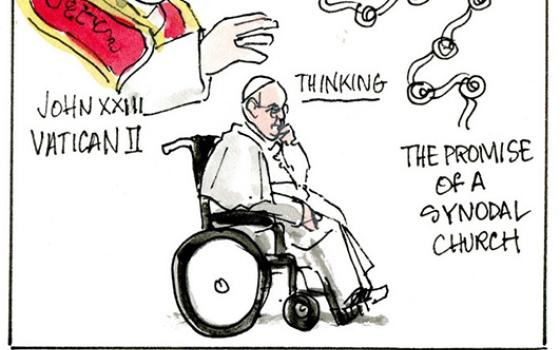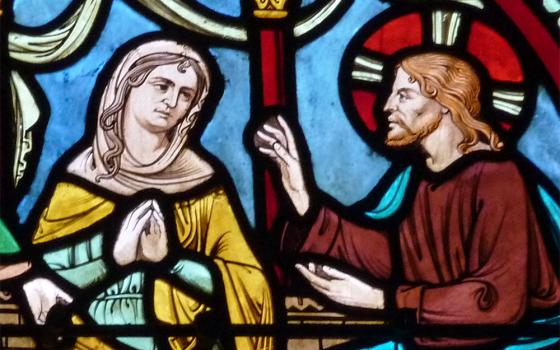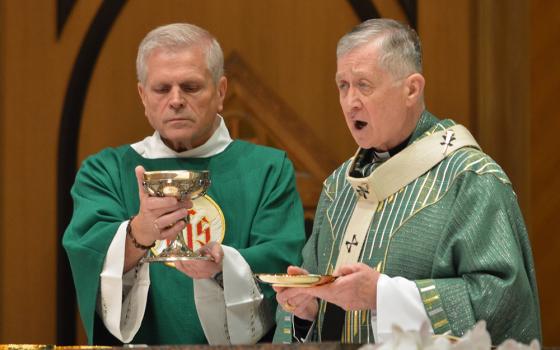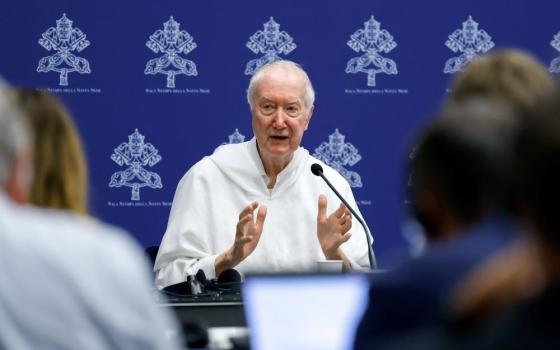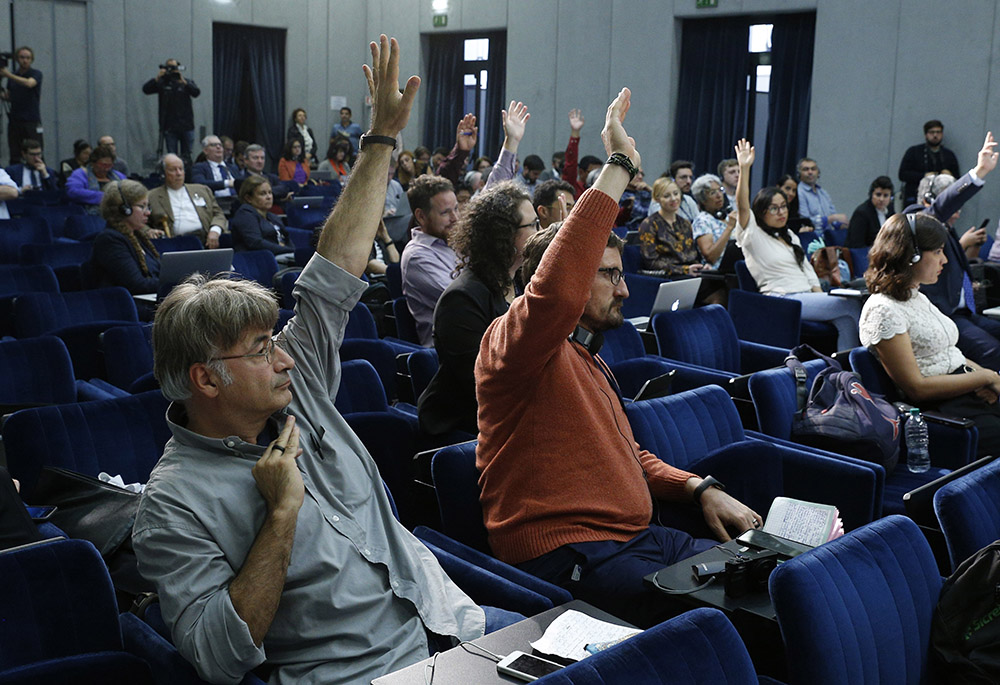
Reporters raise their hands to ask questions during a news conference after a session of the Synod of Bishops for the Amazon at the Vatican Oct. 22, 2019. (CNS/Paul Haring)
My first synod was in 1985, when Pope John Paul II called an extraordinary synod to reflect on the Second Vatican Council 20 years after it ended. I have covered almost every synod since.
It has never been easy. Meetings of the synod are usually closed, and the information released to the press is carefully controlled. The Vatican wishes to project an image of prayerful harmony in which the bishops exchange ideas with no conflict.
The media, on the other hand, thrives on conflict. You will never read a headline saying, "Participants love one another; everything is fine."
Covering the synod on synodality has been especially difficult. Pope Francis does not like the press, especially the Western media, which, he believes, only writes about issues of concern to the Global North.
Thus, at the 2015 synod on the family, the coverage focused on Francis' intentions for divorced and remarried Catholics. Can they get annulments? Can they go to Communion? And can married couples practice birth control?
There was little concern for the plight of refugee families, of human trafficking, of forced marriages or of families broken by the need for men to migrate to find work to support their families.
Likewise, at the synod on the pan-Amazon region in 2019, the Western media's focus was on the possibility of ordaining married men to deal with the shortage of priests in rural communities in the Amazon, which many thought might open the door to married priests everywhere.
Advertisement
Little attention was given to the Indigenous people in the region who were being displaced and killed in order to provide beef, lumber and minerals to the industrialized world. Nor did the importance of the Amazon rainforest as a consumer of carbon dioxide get much attention.
At the current synod, the media is no less fascinated by hot-button issues put on the agenda by Catholics in the church's global listening sessions that kicked off the synod: blessings for gay couples, the prospect of married priests and women priests and deacons.
For Francis, the synod is about a new way of being church, a path for overcoming divisions through conversations in the Spirit and a new way of making decisions in the church through discernment.
Every synod has had an antagonistic relationship with the media. Journalists are suspicious by nature. The media suspects people are hiding something, and the less you give reporters, the more suspicious they become.
Francis has acknowledged that earlier synods have been tightly controlled by the Vatican. At the 2001 synod on the role of the bishop, called by John Paul II, Francis was named a "relator" — a papal-appointed coordinator — and he recalled being told what topics could not be discussed. If they were discussed, he was told, they should be left out of the public reports.
At the first synod Francis oversaw as pope, he encouraged the members to speak boldly and not worry about what people thought.
Despite the general gag order, information about the synods generally got leaked to the Italian press. Many observers see in this a method for officials of the Roman Curia, the bureaucrats of the church, to control the narrative of the synod. Stop the bishops from talking to the press while at the same time secretly giving stories to the Curia's favorite journalists.
There is some logic to confidentiality for synodal discussions. Secrecy promotes free debate and allows members to speak without fear of retribution from their hostile government.
How much material is made available to the press has varied from synod to synod. At some, nothing was made public except the final report. At others, speakers could release part of their addresses, but not the full texts. Some American bishops have responded by dropping the first sentence, the one greeting the pope and the synodal members, then publishing the rest.
Some synods even released the reports from the small group discussions. These reports gave a summary of the discussions but never told who said what. I found them very helpful in writing stories on the synod.
At the synod on synodality, major addresses have been open to the press, but, sadly, the reports from the small group discussions remain secret. In addition, the major addresses have been more on process than substance, which gives the media little to talk about. Without access to the small group discussions, the press is not able to get a feel for what is going on in the synod.
The Vatican approach to the press is the equivalent of telling people what pots and pans are in the kitchen without letting them watch the chef cook the meal. Eventually the synod may serve a delicious meal, but no one will know how they did it. No one will learn how to cook.
Since releasing the reports from the small groups in the past did not harm the synodal process, it is incomprehensible why Francis refuses to allow it for this synod.
Without anything to write about, the media is giving attention to the sideshows and demonstrations happening outside the synod. I have chosen to look elsewhere, writing about Laudate Deum, the pope's new document on global warming, or to cover the byplay leading up to the synod: the "dubia," or questions raised by five conservative cardinals, and the retreat talks given to the synodal members by the Dominican Timothy Radcliffe prior to the synod.
Francis does not understand that, when it comes to the media, you either feed the beast or the beast eats you. You either control the narrative, or the narrative is controlled by anyone who grabs the media's attention.
In the past, it was the progressive press that saw conspiracies everywhere. Today, it is the conservative Catholic media that believes that everything is being controlled by a cabal of liberal theologians and officials.
Perhaps the pope should lock up the press and force them to do a month of prayer, conversation in the Spirit and discernment. That would be fun to watch.





